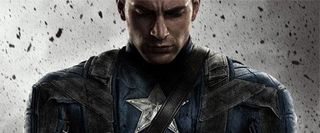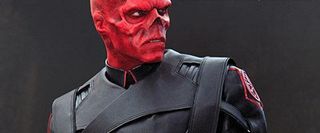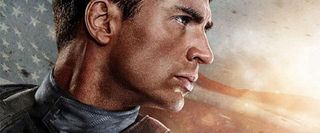Exclusive Interview: Captain America Writers Christopher Markus And Stephen McFeely

Even before casting was announced or a director was chosen, there was audible questioning as to how one would bring the Marvel character Captain America to the big screen. From the character’s goofy origins as a propaganda figure during World War II to selling the patriotism internationally, there were more than a few roadblocks (and reflections back on the movie from 1990 didn’t help either). Flash forward to last weekend when Captain America: The First Avenger not only took the top spot at the box office away from Harry Potter, but earned great praise from critics, many of whom called the movie Marvel’s best since Iron Man in 2008. One of the biggest reasons for the film’s success was the great script by Christopher Markus and Stephen McFeely.
Last week I had the chance to chat with the writing duo over the phone to discuss the new film, which also happens to be the last before next year’s The Avengers. Check out the interview below in which they discuss their approach to the character, mixing in the propaganda origins, and talk a bit about the proposed sequel.
Just from a personal standpoint, I can’t imagine really a job in Hollywood cooler than writing a script for a comic book movie, so I’m curious, how did you first come to the project?
Christopher Markus: We kind of chased it down. We had heard in spring of 2008 that they were gonna do it, and that they were going to do it “period,” which was particularly interesting for us, and so we set about trying to convince them that we were the right guys. We were number one on their list, so we spent the summer reading a lot and going into Marvel every six weeks saying, “Here’s our next idea,” and “Here’s what we might do if you hire us. We’re very agreeable!”
What do you think it was about what you brought to the table that made them decide that you were the right guys for the project?
Christopher Markus: In the end, physical attractiveness. I think in the end it was our affection for and understanding of Steve as a character was sort of secondary because there’s so many historical story demands and origin story demands, production demands, really what they were looking for was someone who could hang on to that ninety year old, I mean ninety pound kid throughout the movie and maintain his humanity.
Stephen McFeely: And remember, that’s not a thing that in most Captain America comics is necessarily the primal factor. Because we’re not watching him all the time. It’s another thing that our movie added, what makes him tick, when he’s in the right, things change...
CINEMABLEND NEWSLETTER
Your Daily Blend of Entertainment News
Is there kind of a list of character qualities that you had to include under penalty of a fanboy death, or others that you felt had more flexibility, that you could change?
Christopher Markus: Oh sure, yeah. I mean you can’t go into Steve Rogers is a lying womanizer, it’ll be a lot more entertaining...He’s got to be the moral center of the movie, he’s got to be the most upstanding guy. The challenge is to keep that, not let him sink into being just the straight man.
Stephen McFeely: But there’s stuff from the comic that we did not do but don’t necessarily need. There’s a whole run in the comics where he becomes a graphic artist on Madison Avenue. That’s not necessary for us to do.

You mentioned when you were developing, when you were trying to convince Marvel that you were the right guys for the project you were reading comics, but once you actually go the assignment, what was your main focus in terms of what did you read? And did you actually have a chance to have a talk with the comic book writers about the character?
Christopher Markus: We have never had a chance to talk to them.
Stephen McFeely: I think we’re going to meet a few next week.
Christopher Markus: Ed Brubaker is going to the premiere. He’s very intellectual, just because he’s done a great job of combining the weight of the past. His World War II is really kind of gritty. He’s the one who made Bucky a man as opposed to a twelve year old. I don’t think there was ever a chance we were gonna have Bucky go, [in high pitched voice] “Hey, let’s go fight Nazis!” That, and then, you know, ever version of the origin stories. There’ve been a few.
Another question that I had, going on Bucky, he really is, that original boy wonder character was never going to play on, actually it really even goes beyond that, there’s a lot of the stuff from the early forties comics that are kind of goofy and campy, almost like the characters kind of use this propaganda tool and you kind of focused on trying to draw the character away from those elements?
Christopher Markus: Well we wanted to address the propaganda part of it. We have the USO section, which sort of underlined that. We ourselves don’t want to use Captain as a propaganda tool, but we wanted to recognize that it happened to him many, many times over the run of the comics. And he’s wrestled with it a lot over the run of the comics, that’s sort of one of the interesting threads over the years is Cap’s definition of himself versus other people’s interpretation of what this guy should be. Plus the propaganda issue is the best way to explain the outfit. Which needed a little grounding. If somebody just made the decision to randomly put on that particular outfit it could take you out of the movie. See it that way.

When it comes to those kind of details, did you kind of have an idea of what the costume would look like while you were writing the script, or is that something that came through in the production phase?
Christopher Markus: It did. The production phase is so long, we’ve been on it for so long, that pretty early on we knew it was going to be something like it looked like. We had something to look at all along the way. From the very first time we went into Marvel they already had, lying and waiting, brought really great versions of what Cap would look like in a more realistic world, and that was, that not only did he wind up looking a bit like that, but it was also very helpful in grasping the character, the person in reality when you see this guy in his costume. It’s got buckles and snaps and laces on things, he’s not just dancing around.
On that same kind of notes in terms of script detail, when you were writing the script there are multiple action sequences in this film, how in depth did you get or did you kind of just have a basic outline and left Joe Johnston to fill in those gaps?
Christopher Markus: It varies by the thing, but it becomes a team effort. There’s storyboard guys, there’s Joe, there’s the stunt guys. We tend to go big and just say, do things that aren’t realistic, and then the stunt people actually do things that are possible in the real world, in moviemaking. We never just go, “And then action happens.” The script, when you’re reading it, you want to keep the movie entertaining. We did have a couple ideas that made it all the way from advance copy into the movie.
Stephen McFeely: Some of them are just strong panels of various comics. If he took out a guy in a particularly interesting way, sometimes we were in love with it and we would just keep shoving it in there, draft after draft.
On that kind of note, how much did the script change from first draft to shooting script to the final cut of the film?
Christopher Markus: It changed a lot in that we were on set for about five months, so every day we changed it a little. Not because it had problems but because, you know, an actor makes an observation or something. It didn’t change hugely from the origin story, so you know how he’s going to become Captain America and you know how he’s going to get to the present day. So the basic outline was always there. There were times where an action sequence would take place on a hot air balloon and you’d go back and forth on that, but the shape of it was pretty clear.
Stephen McFeely: Yeah, the end of act one has always been the end of act one.

I know when Joss Whedon came on to direct The Avengers, he also contributed a bit to the Captain America script. What exactly did he bring to the table?
Christopher Markus: Well basically he just did a read through and continuity pass, just to make sure that his Steve was gonna match up with our Steve so that there wouldn’t be this, all of a sudden he’s a wise cracking joker in 2012. It was really just more of the kind of making sure that the whole universe meshes together.
On that note, Marvel, just the way they’ve been structuring their films since Iron Man in 2008, there always seems to kind of be this look toward the future, and they are trying to maintain continuity. When you were working on this script, was that something that was in the back of your mind? Or because most of this story takes place back in the 1940s, is that something that you can be a little bit more loose with?
Stephen McFeely: We were freer than some other movies got to be. Being chronologically first, we get to sort of roll balls out there that other movies have to take out. But it’s fun. It matched what we wanted to do with a lot of the characters in the movie. For example, with Howard Stark, we were gonna need a character like Howard Stark anyway to help outfit Steve and give him the shield so he can run in the costume. So if that guy has some resonance outside of the movie, our movie, that’s great.
Christopher Markus: Same thing with the cosmic cube. We needed this Maguffin, we needed this thing to give Red Skull his advantage, and to have it come from Asgard, to have it come from the world of another of the Marvel movies in setting up this whole structure, it just answered a big question for us that we would have had to answer anyway. Instead of the Skull coming out of the secret basement lab having invented the cosmic cube there’s a ready way to supply it.
Stephen McFeely: And hopefully you don’t have to have seen Thor. But it’s in there.

To that idea also, in addition to being part of the entire Marvel movie universe, Captain America will likely, in all likelihood will be getting a direct sequel.
Christopher Markus: Nothing is certain at this point.
I know you’re also working on the script, but when you’re working on, they are always thinking on this, when you were writing the script were you keeping in mind possibilities for the direct sequel in addition to The Avengers.
Stephen McFeely: You know, it’s weird because there is already a sequel in a way. We’re already in the process, and as we were out writing and coming up with ideas, it was really hard until we read The Avengers. Because we would scale down these great scenes, unless Joss Whedon already did it, and I don’t know yet. So once we read The Avengers we went alright, here’s where we can take a path that he hasn’t explored yet.
Christopher Markus: But already in the first one, that’s always kind of the, not so much in how you shoot the first one, but the knowledge that all these friends he’s making, this is a guy who never had a place, finally finding a place, and you know that it can be taken away from him again. In the sequel he’s sort of back where he was when he was a scrawny kid with no home, the one home he had found was seventy years ago. So that is kind of a fun thing to have in the back of your head. And also the fact that there’s so many great villains and storylines that you can’t cram into one, so you sort of keep a side pile. “We don’t have room for it now, but there’s no way I’m not putting it in later.”
Also, I’m curious, you mention that you are working on the outline for the sequel. Have you decided, do you know if it is going to be taking place in modern day or is it gonna be going back to the 1940s?
Stephen McFeely: Everything is on the table at the moment. It’s very likely that it’s modern day and what we’re talking about is trying to figure out a way to weave in a logical, necessary flashback. Which is what the comics do a lot, things from the past come back.
If you are playing with both timelines, they obviously do have challenges, especially in the present where if you’re following the events of the Avengers, you kind of have that whole thing, and this is true for the comics as well, you have to wonder, if Cap is going off to face this villain, why aren’t the rest of the Avengers coming with him? Have you figured out how you’re going to work with that situation?
Christopher Markus: In some ways, I logically understand that question, but when I’m reading the comic book, I never ask that question. I never go, well why doesn’t he just call Thor. It’s also a matter of making the action personal. It’s gotta be personal for Steve Rogers and his development.

Eric Eisenberg is the Assistant Managing Editor at CinemaBlend. After graduating Boston University and earning a bachelor’s degree in journalism, he took a part-time job as a staff writer for CinemaBlend, and after six months was offered the opportunity to move to Los Angeles and take on a newly created West Coast Editor position. Over a decade later, he's continuing to advance his interests and expertise. In addition to conducting filmmaker interviews and contributing to the news and feature content of the site, Eric also oversees the Movie Reviews section, writes the the weekend box office report (published Sundays), and is the site's resident Stephen King expert. He has two King-related columns.
Most Popular



